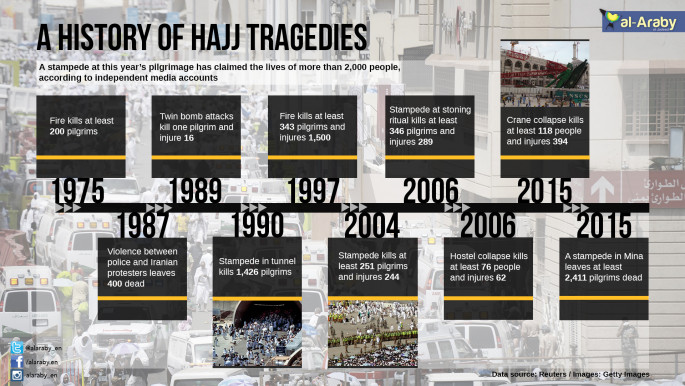Senior Saudi cleric accuses Iran of politicising Hajj
During a sermon at the Grand Mosque in Mecca, Saleh bin Abdullah bin Hameed alluded to the political dispute between Iran and Saudi Arabia over this year's Hajj.
The comments highlight the major breakdown in diplomatic relations between the two regional rivals that began in early 2016 shows little signs of abating.
"When Muslims travel to this country as pilgrims they represent their unity and forget their differences. They recognise that the holy lands are not fields to address their differences and settle scores," Hameed said during his weekly sermon at Islam's holiest site.
In an indirect reference to Iran, Bin Hameed repeated a long-running Saudi government accusation that Iranian authorities seek to politicise the pilgrimage.
"They want to take advantage of the worship season and the gathering of Muslims and the holy sites for political gain, to wreak havoc and cause chaos, and that leads to divisions and sowing discord," said Hameed, whose website lists him as an adviser to the Saudi Royal Court.
The comments follow a break-down in negotiations between Saudi Arabia and Iran concerning Iranian pilgrims to Mecca for this year's Hajj pilgrimage.
Last week Iran announced its nationals will miss the annual Hajj this year, after a delegation failed to reach an agreement with Saudi Arabia on security and travel arrangements for Iranian pilgrims.
"The sabotage is coming from the Saudis," Iran's minister of culture and Islamic guidance Ali Jannati said, "Their attitude was cold and inappropriate."
Last year at least 464 pilgrims, including a significant number of Iranians, were killed in a stampede outside Mecca for which the Islamic Republic blamed Saudi Arabia's "incompetence."
In the aftermath some Iranian officials called for control of the Hajj, a religious pilgrimage obligatory on all capable adult Muslims, to be taken away from Saudi government control.
The incident highlights significant tensions between Saudi Arabian authorities, who majorly prize their symbolic role as patrons of the Holy sites of Mecca and Medina, and Iranian pilgrims.
In 1987 a deadly incident between Iranian pilgrims – who held demonstrations in Mecca – and Saudi police led to the death of over 400 people and further soured relations between the mutually-hostile states.
This year's dispute over Hajj continues the major downward spiral in relations between Shia Iran and Sunni Saudi Arabia who are at odds over a raft of regional issues, notably the conflicts in Syria and Yemen, in which they support opposing sides.
In January 2016 Riyadh cut ties with Tehran after Iranian demonstrators attacked the Saudi embassy in Tehran and a Saudi consulate in the Iranian city of Mashhad following the execution of prominent Saudi Shia cleric Nimr al-Nimr.
Saudi Arabia has used claims of "Iranian interference" to justify its harsh security measures and supress demands by the minority Saudi Shia population particularly in the eastern regions of the kingdom.
A recent trial of over 30 Saudi Shia men accused of "treason and spying for Iran" drew condemnation from rights organisations.
Agencies contributed to this report
 |



![sudan women [getty] sudan women [getty]](/sites/default/files/styles/image_330x185/public/media/images/5019D7F4-52AF-4377-8A05-885D27476479.jpg?h=d1cb525d&itok=tKXV7r-W)